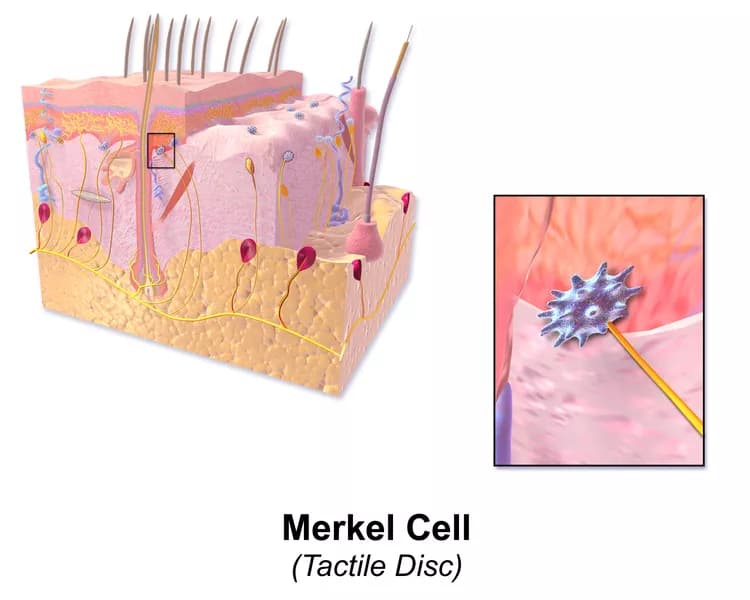
Identifying How Merkel Cell Polyomavirus Infection Can Cause A Lethal Carcinoma
A benign virus normally found in the skin can lead to a type of rare, lethal skin cancer. Specifically, infection by the Merkel cell polyomavirus can lead to Merkel cell carcinoma in immune-compromised individuals. Researchers have now identified a type of skin cell as the target of the virus in humans. This study, from the Perelman School of Medicine at the University of Pennsylvania, establishes a new way to investigate this type of oncogenic viral infection and identifies a potential therapeutic agent against Merkel cell polyomavirus infection.
Merkel cell carcinoma, which metastasizes rapidly, is one of the most aggressive skin cancers, with a mortality rate of 33 percent, exceeding that of melanoma, and a 45 percent five-year survival rate. Given these dire statistics, researchers are keen to find better treatments.
Senior author Jianxin You, PhD, an associate professor of Microbiology, published her results this month in Cell Host & Microbe. "We established a cell culture model for Merkel cell polyomavirus infection, which will help us find how this DNA virus causes cancer," You said.
Using this model, the team discovered that the activation of special enzymes called matrix metalloproteinases by a cellular signaling pathway involving the WNT and b-catenin proteins stimulate Merkel cell polyomavirus infection. "This suggests that Merkel cell carcinoma risk factors such as ultraviolet radiation and aging, which are known to stimulate the expression of these metalloproteinase enzymes, may promote viral infection and thus drive the development of cancer."
These enzymes work in wound healing to re-engineer the skin as it heals. For example, if the skin is harmed by excessive sunlight, this stimulates the WNT/β-catenin signaling pathway, which in turn activates the metalloproteinase enzymes to be made. In the wound-healing process, these enzymes "chew up" the extracellular matrix of affected cells. This could allow viruses to enter the cells of the dermis skin layer, surmise the researchers.
The Merkel cell polyomavirus is an abundant virus frequently found on healthy human skin. Excessive exposure to sunlight and ultraviolet radiation, immune suppression, and advanced age are the most important risk factors for Merkel cell carcinoma. Although the exact function of Merkel cells, found in the lower part of the skin epidermis, is unknown, they are thought to be nerve-associated cells involved in light touch sensation
This study also found that the FDA-approved drug trametinib for melanoma and other cancers blocks viral infection by stopping Merkel cell polyomavirus transcription and replication. Low doses of trametinib wiped out viral infection in the cell culture model developed by first author Wei Liu, PhD, a senior postdoctoral fellow in the You laboratory. In addition, normal control cells were not affected e trametinib, giving hope to the fact that this drug might be able to be used with little side effects for reducing the viral load in immunocompromised patients and the goal of preventing the development of Merkel cell carcinoma.
"Building on this novel cell culture model for Merkel cell polyomavirus infection, we would like to establish an animal model to elucidate the mechanisms by which Merkel cell polyomavirus infection leads to the highly aggressive Merkel cell carcinoma," Liu said.
This work built on the system for production of both Merkel cell polyomavirus pseudovirus and recombinant virions established in the laboratory of Christopher B. Buck, PhD at the National Cancer Institute.
The above post is reprinted from materials provided by Perelman School of Medicine at the University of Pennsylvania. Note: Materials may be edited for content and length.
Disclaimer: DoveMed is not responsible for the adapted accuracy of news releases posted to DoveMed by contributing universities and institutions.
Primary Resource:
Liu, W., Yang, R., Payne, A. S., Schowalter, R. M., Spurgeon, M. E., Lambert, P. F., ... & You, J. (2016). Identifying the Target Cells and Mechanisms of Merkel Cell Polyomavirus Infection. Cell host & microbe.
Related Articles
Test Your Knowledge
Asked by users
Related Centers
Related Specialties
Related Physicians
Related Procedures
Related Resources
Join DoveHubs
and connect with fellow professionals

0 Comments
Please log in to post a comment.